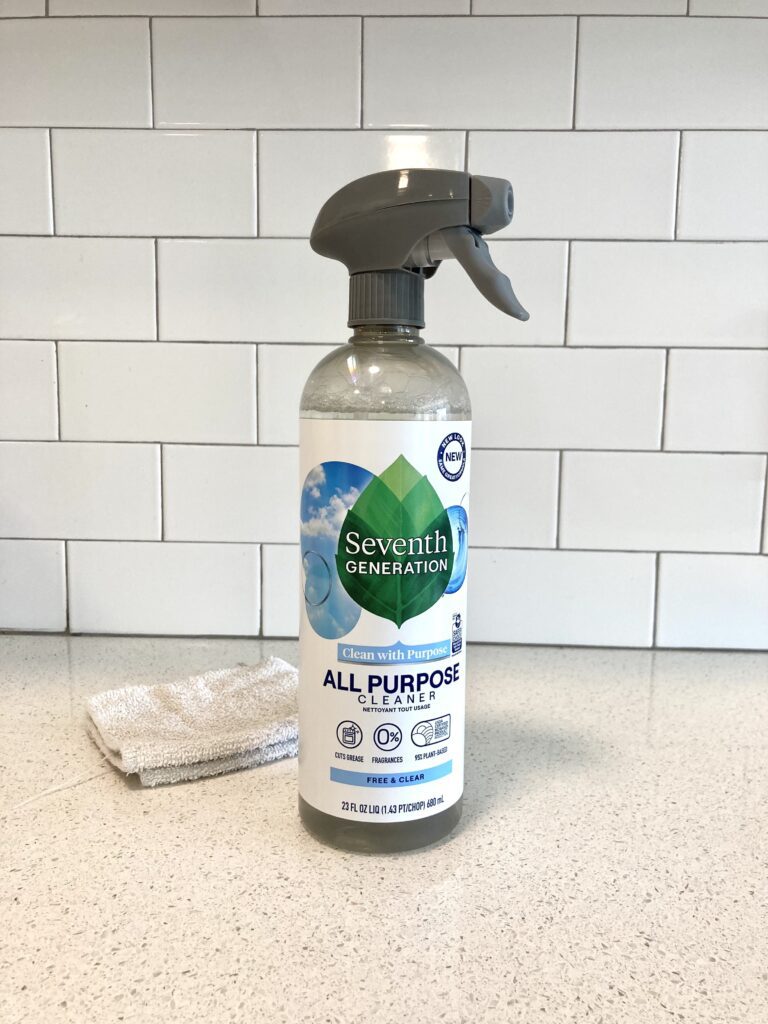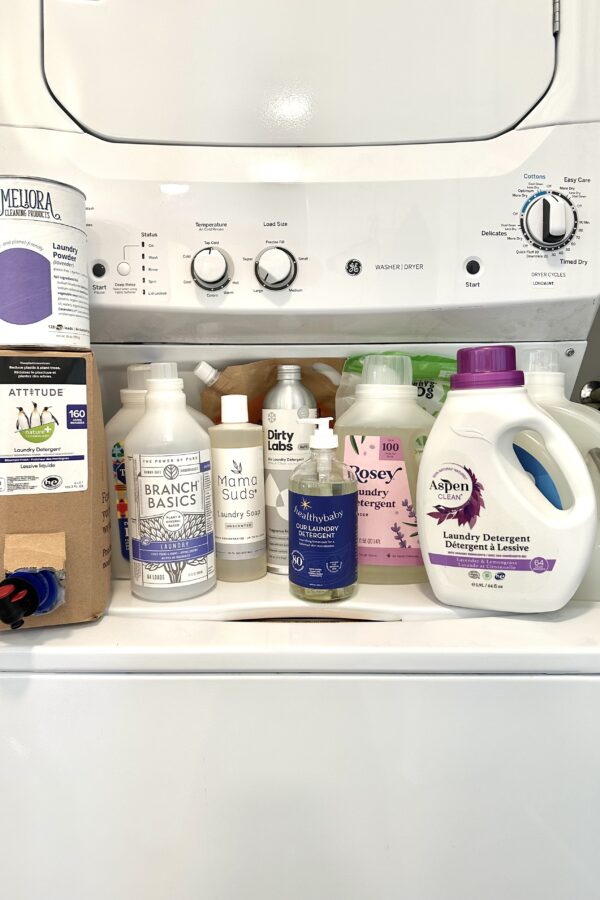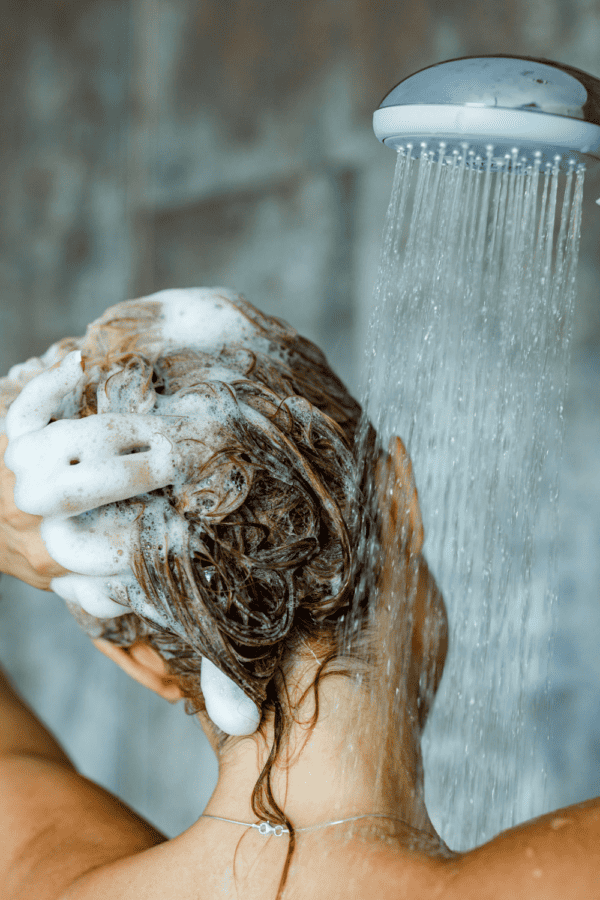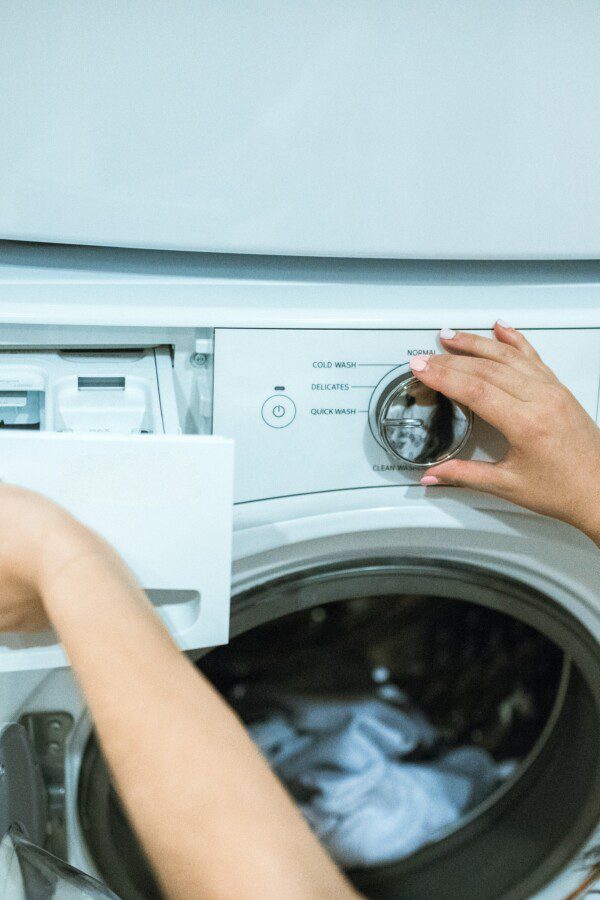There’s a handful of “green” cleaning and personal care brands that line the shelves at big box retailers and offer consumers a safer and more accessible option to low-tox cleaning. Seventh Generation is one of the most recognizable “sustainable” consumer brands that has become mainstream in recent years, and others include Mrs. Meyer’s, Method, 9 Elements, Grove Collaborative, and Everspring.
But while these brands claim to offer “eco-friendly” and “safe” options for consumers, they’ve also been accused of greenwashing.
So in this article, we’re going to take a deep dive into Seventh Generation’s ingredients and explore the pros and cons of this brand’s safety and sustainability initiatives so that you can decide for yourself whether or not you want to use their products.
IN A NUTSHELL:
- Seventh Generation is free from most of the worst ingredients, including endocrine disruptors (like phthalates).
- That being said, they still use some not-great ingredients, most of which are either irritants or ethoxylated ingredients.
- In general, Seventh Generation is more transparent about their ingredients compared to a lot of other conventional cleaning brands, which gives more decision-making power to the consumer.
- Seventh Generation is a B Corp certified brand that has a lot of sustainability initiatives in place, including steps to reduce plastic and greenhouse gas emissions. (They still use a lot of plastic though.)
- Seventh Generation is now owned by Unilever, a large corporation that has faced environmental criticism in the past and that also manufactures other products that are not very eco-friendly/non-toxic.
- Seventh Generation is definitely not the worst brand to buy, especially if you need to pick up something quick at the store. But it’s not the best either, and those with sensitive skin, allergies, and other sensitivities will want to be mindful of irritating ingredients.
Table of Contents
- An Overview of Seventh Generation
- Is Seventh Generation Greenwashing?
- The PROS
- The CONS
- 1. Potentially Irritating Ingredients
- 2. Ethoxylated Ingredients
- 3. Room for Improvement in Sustainability
- 4. Owned by Unilever
- 5. Some Questions Still Remain
- Summing Up the Pros & Cons:
- A Few More FAQs About Seventh Generation
This article contains affiliate links, meaning we may earn a commission if you decide to make a purchase.
An Overview of Seventh Generation
Seventh Generation is a brand that sells cleaning and personal care products, such as:
- Laundry detergents, stain removers, and fabric softeners
- Dish soap and dishwasher detergent
- All-purpose cleaners
- Toilet bowl cleaners and disinfectants
- Paper products like toilet paper, paper towels, napkins, and tissues
- Hand and body wash
- Deodorant
- Tampons, pads, and liners
- Baby diapers and wipes
The brand’s name is inspired by an ancient Iroquois philosophy which states that “in our every deliberation, we must consider the impact of our decisions on the next seven generations.”
It was founded in Vermont in 1988 and was independently owned until 2016 when it was acquired by Unilever.
Seventh Generation is available at a variety of retailers, including Target, Walmart, Grove, Thrive Market, Whole Foods, Amazon, and others.
Is Seventh Generation Greenwashing?
Terms like “eco-friendly,” “sustainable,” “green,” and “non-toxic” obviously get thrown around a lot these days, but they don’t actually mean anything definitive. Brands are essentially free to use these terms at their discretion. There is no list of specific qualifications they have to meet or third party organizations that check on the claims they make (besides accountability and pressure from consumers!).
In reality, it’s usually more of spectrum. A product can be more eco-friendly than another without being 100% sustainable. A brand may keep their product free from the most harmful ingredients, while still utilizing some of the somewhat problematic ones.
This can leave a lot of room for consumer confusion and give brands lots of opportunities to greenwash.
This idea of the spectrum tends to be very applicable when it comes to these big “green” cleaning companies such as Seventh Generation and Mrs. Meyer’s. These brands tend to be land somewhere in the middle of the spectrum: they’re better than other conventional brands, but there’s still lots of room for improvement, too.
Because of this, the answer to whether or not Seventh Generation is guilty of greenwashing becomes somewhat subjective. So, let’s look at the pros and cons of this brand’s products so you can decide what you think for yourself.

The PROS
1. Ingredient Transparency
One of the best things about Seventh Generation is that they’ve been committed to ingredient transparency for quite a while, even before more recent changes in California legislation required cleaning companies to make their ingredient lists publicly available.
Seventh Generation not only makes their ingredients available for consumers online, but they also list the full ingredients on the actual products (many brands still don’t!). They also list out the actual ingredients used for fragrance (which are essential oils and/or plant-based) and indicate which ones are considered allergens by the E.U. This is a pretty big deal because it means you don’t have to worry about phthalates and other worrisome ingredients being hidden in these ingredients under the fragrance loophole.
Seventh Generation also has an ingredient glossary available on their website so you can find out about a lot of the ingredients they use in their collection (along with why they’re used and how they’re generally sourced).
At first glance, this glossary appears to be a complete list; however, it’s actually not. When comparing the ingredient list for their Fresh Morning Meadow All Purpose Cleaner against the ingredient glossary, we found several ingredients missing from the glossary (octyl/decyl glucoside, PEG-6 methyl ether, octylisothiazolinone, isoamyl acetate, hexenyl acetate, and trans-2-hexenal).
It might be better if all of the ingredients were actually listed in that glossary, but at least we can still find the full lists on the individual products!

2. Free From the “Worst” Toxic Ingredients
If you take a closer look at those specific ingredients, you’ll find that most of them are generally safe. Seventh Generations products appear to be free from some of the worst toxicants found in other cleaning products, including phthalates (and other types of endocrine disruptors), QUATs, and optical brighteners.
Even most of their disinfection products use Thymol as the active ingredient, which is a safe and mush less harsh disinfectant compared to the chlorine-derived synthetics that many disinfecting products use. (Thymol is still just as effective against the viruses and bacterias of concern.)
And if you or someone in your family is sensitive to thymol (or just don’t prefer that smell!), they also offer a fragrance-free disinfectant option that uses hydrogen peroxide instead. Hydrogen peroxide can sometimes become irritating at higher levels, but like thymol, is still a much safer option than other disinfectants.
Many of the ingredients used in Seventh Generation’s products are truly natural, while others are derived from natural/plant-based ingredients. That being said, most of the products can’t be considered “all-natural” because they do still contain some synthetics. Some of these synthetics are perfectly harmless while others may be problematic for some people (more on that below).
3. Sustainability Initiatives
Seventh Generation has a number of environmentally-conscious initiatives in place, and they even publish a lengthly annual “Corporate Consciousness Report,” which outlines their environmental and social footprint, goals, and more.
Some of the sustainability initiatives Seventh Generation has in place include:
- Using concentrated formulas to cut down on plastic packaging
- Certain zero plastic products like this toilet bowl cleaner
- Making continual improvements on palm oil sourcing
- Support of non-profit organizations
- B Corp certified
- Targets for the future (zero waste, reductions in greenhouse gas emissions, sustainable ingredient sourcing, etc.)

The CONS
1. Potentially Irritating Ingredients
As mentioned above, Seventh Generation’s products are free from the harshest ingredients, but there are still a few ingredients that might be concerning, especially for some people.
Most of these ingredients fall under the “irritant” category, which means they’d be of most concern for people with sensitive skin, eczema, allergies, asthma, etc. They include things like:
- Synthetic preservatives such as methylisothiazolinone and benzisothiazolinone. These can be irritating to the skin, eyes, and/or lungs.
- Sodium lauryl sulfate (SLS), which is used as a surfactant that helps in the cleaning process. Again, SLS can be irritating to some. You can read more about it here.
- Natural fragrance allergens like linalool, d-limonene, citral, geraniol, etc. These are plant-derived ingredients that are used by a lot of cleaning and personal care brands (including the most natural and non-toxic ones). Although these ingredients are safe for most people, they can also be irritating for some individuals. Seventh Generation does have fragrance-free options that don’t include these ingredients, so just check the label.
2. Ethoxylated Ingredients
The second potentially concerning ingredient category that’s worth noting is ethoxylated ingredients. Ethoxylated ingredients are practically impossible to avoid completely; they’re in all kinds of cleaning and beauty products. Whenever you see an ingredient with “eth” in the name, that indicates it’s probably ethoxylated. (For example, the Fresh Morning Meadow all-purpose cleaner mentioned above contains PEG-6 methyl ether, which is an ethoxylated ingredient.)
The concern with these ingredients actually comes from contamination during the manufacturing process. There are two main chemicals of concern that are used to process ethoxylated ingredients: 1,4 dioxane and ethylene oxide.
Ethylene oxide is an irritant that’s known to cause multiple types of cancer and infertility. And 1,4 dioxane is also a known carcinogen. These ingredients aren’t added intentionally (and therefore won’t be found on any ingredient labels), but they’ve been found as contaminants in personal care products and cosmetics more than a few times.
Ethoxylated ingredients definitely aren’t the worst toxicants around, and again, they’re so widespread in consumer products that they’re practically impossible to avoid completely. But many consumers still want to be aware of them because of those contamination concerns. There are certainly cleaning products on the market that don’t use them (like Branch Basics and Force of Nature).
3. Room for Improvement in Sustainability
Despite Seventh Generation’s sustainability initiatives, they still use quite a bit of plastic. Plenty of other cleaning companies now offer refillable options that use little to no plastic at all, so they could definitely continue to make improvements here.
4. Owned by Unilever
Since 2016, Seventh Generation has been owned by Unilever, one of the largest consumer goods corporations. Some consumers might not care about this, but it’s a potential concern for many conscious consumers for a few reasons:
- Sadly, large corporations are just generally less trustworthy when it comes to ethical and sustainable operations across the board. Unilever has faced criticism in the past for things like toxic mercury contamination, for being one of the top ten global plastic polluters (by BreakFreeFromPlastic), for pressuring a publication to promote toxic (and racist) skin lighteners, and for participating in violence against striking workers.
- The larger the company, the more spread out the supply chain tends to be and the less oversight the team has over the manufacturing process (leaving more room for questionable sourcing methods, contamination concerns, etc.). In fact, Seventh Generation says they do not own the facilities where their products are made, which means they probably have less control and oversight over the process as a whole.
- Unilever owns plenty of other brands (like Axe and Dove) that use harmful ingredients, and this may come off as hypocritical to some consumers. The stated environmental goals of Seventh Generation could potentially be at odds with other Unilever brands and/or their investors, as it is a publicly traded company.
5. Some Questions Still Remain
Despite Seventh Generation’s ingredient transparency, there are still some questions. For example, the brand has a goal of “Zero Chronic Toxins” by 2025, but it’s unclear what they actually mean by that. What “chronic toxins” are they referring to?
We reached out to the brand to ask for more clarity about this but haven’t heard back from them yet. We’ll update this article if and when we find out!
It’s also disappointing to see that Seventh Generation has apparently discontinued its “Not Just” collection of body washes and deodorants, which were MADE SAFE certified (one of the best third-party certifications for ingredient safety). It appears that these products didn’t stay on the market for very long, but it’s unclear why that is. Hopefully Seventh Generation will certify some of their other products with MADE SAFE in the near future!
Summing Up the Pros & Cons:
PROS:
- Ingredient transparency
- Free from a lot of potentially toxic ingredients like phthalates, optical brighteners, phosphates, and synthetic surfactants
- Available at a lot of big box retailers
- Various sustainability initiatives in place such as reducing plastic and GHG emissions
CONS:
- Some not-great ingredients are used, such as SLS, methylisothiazolinone, and ethoxylated ingredients
- Still use a lot of plastic packaging
- Owned by Unilever
- They don’t own their own manufacturing facilities but instead work with third-party factories
A Few More FAQs About Seventh Generation
Is Seventh Generation Cruelty-Free and/or Vegan?
Kind of. Seventh Generation’s website states that they no animal ingredients are used in their products; however, none of their products are certified vegan. They are, however, Leaping Bunny Certified, which means their final products are not tested on animals.
Their website explains that there is some nuance regarding the use of animal ingredients throughout the entire manufacturing process. For example, even though there are no animal products in the final enzymes that are added to their cleaners, some enzymes “may use animal derived feedstocks in early stages of their manufacturing process.”
Does Seventh Generation Use Synthetic Fragrance?
Although we were not able to find any information that explicitly states that Seventh Generation does not use any synthetic fragrances in their products, we also couldn’t find any synthetic fragrance ingredients in any of their products. It appears that all of the fragrance ingredients used are plant-derived, but you still might want to check individual product information just in case.
We’ve reached out to Seventh Generation to get more information about this and will update if and when we hear back from them.
Seventh Generation vs. Mrs. Meyer’s
How does Seventh Generation compare to Mrs. Meyer’s? Both of these brands are generally in the “better-but-not-great” category in terms of clean ingredients. However, Seventh Generation is more transparent about their ingredients and appears to be free from synthetic fragrances (while Mrs. Meyer’s is not).
You can read more in our deep dive into Mrs. Meyer’s and decide for yourself!
Who Owns Seventh Generation?
Seventh generation is owned by Unilever. It was independently owned from its founding in 1988 until it was acquired by Unilever in 2016.
Where Are Seventh Generation Products Made?
Seventh Generation states that their products are made in a variety of facilities across the globe, including the US, Canada, Mexico, Europe, and China. They do not own their facilities but rather work with third-party manufacturers.
Is Seventh Generation Septic Safe?
Yes. Seventh Generation states on their website that their toilet paper and all laundry detergent formulations are safe for septic systems.
RELATED ARTICLES:
Looking for more resources on low-tox home care? Here are some more articles you might be interested in:




